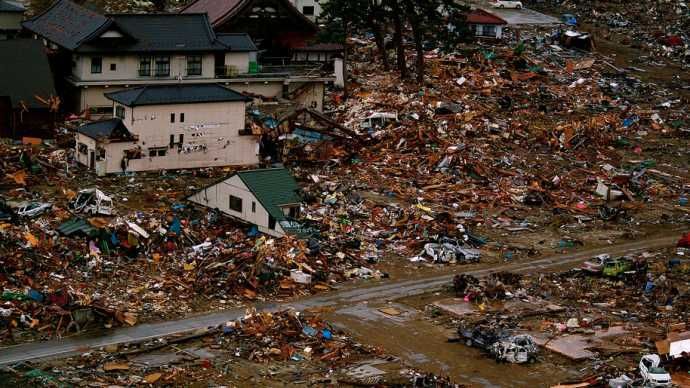Your happiness can grow after a natural disaster. Here's how
Digital Reporter
Friday, May 29, 2015, 3:08 PM - The 2011 earthquake, tsunami and subsequent nuclear reactor meltdown in Japan killed more than 15,800 people, destroyed countless homes, cost more than half a trillion dollars and left a large area unsafe for humans. Yet people in the hardest-hit Fukushima region of Japan are happier now than before the disaster, highlighted in the 2015 World Happiness Report published recently. Researchers cite multiple studies that show how natural disasters improve peoples' overall happiness, in the right circumstances.

2011 Great East Japan Earthquake, Creative Commons file photo courtesy of CECAR/Flickr
Overcoming the hardships of the disaster improved levels of trust and social capital in Fukushima, according to a 2008 study published by researchers at the University of Siena in Italy. It found that if there is a sufficiently high level of social capital, usually marked by level of trust, collaboration and a sense of belonging, countries are able to sustain or improve subjective well-being in the event of a catastrophe.
"The last thing you want people to think is that natural disasters make people happier," said Dr. John Helliwell, report editor of The 2015 World Happiness Report and senior fellow of the Canadian Institute for Advanced Research. "It's that, if the surrounding circumstances are actually more benevolent than what people think and become more benevolent under the disaster, then they end up happier because they work more together and connect more. That bonus can be bigger than the direct psychological cause from the disaster itself.”
To determine levels of trust, World Happiness Report researchers surveyed people in large metropolitan areas. They asked, for example, about the likelihood of a wallet being returned if lost.
In bigger cities, there are lower levels of trust, Dr. Helliwell noted. In Toronto, for example, a local newspaper had conducted the "wallet experiment," dropping 20 around the city each with a fair bit of cash.
The average expected level of return was 25 percent. However, 16 of the 20 wallets were given back.
“We would compare and see if people were right about trust levels and the benevolence of neighbours and we found out that they were outrageously wrong,” said Dr. Helliwell. “It means people are seriously too pessimistic about the trustworthiness and benevolence of their neighbours and it makes them unhappy.”
If, in the face of disaster, people behaved better then they expected of each other, happiness increases, the study found. If people were disappointed in each other's behaviour, happiness decreased.
"If the social situation starts degrading, then trust can be destroyed very quickly,” Dr. Helliwell said. “The classic example is looting and robbery. If that becomes prevalent than everyone runs for cover and starts defending their turf and things can get very nasty, very quickly.”
However, natural disasters can provide citizens with an opportunity to discover, use and build upon communal links, the report notes.
“It's a surprising result," Dr. Helliwel said. "Working together to deal with the problem can create enough happiness to more than overcome the damage and injury done by the disaster."
Natural disasters are what researchers like to call “natural experiments,” Dr. Helliwell noted. “They are unplanned and unforeseen so then you can compare consequences in different communities. It’s almost an experimental setup."
Findings showed the devastating 2004 tsunami that brought massive damage to both Sri Lanka and Aceh, Indonesia had the opposite effects in terms of happiness in each area.
In Aceh, cultural conflicts had been dividing people, but the disaster brought them together.
“They created peace out of the chaos because working together increased belief in eachother's humanity and goodwill,” said Dr. Helliwell.
In Sri Lanka, however, Tamils and Sinhalese had been fighting for decades. Mistrust was so high already that the disaster only provided more for people to fight over in terms of aid and supplies. Ultimately, the level of animosity had increased.
WORLD'S HAPPIEST COUNTRIES |
WORLD'S LEAST HAPPY COUNTRIES |
1. Switzerland | Lausanne Forecast |
1. Togo | Lome Forecast |
2. Iceland | Reykjavik Forecast |
2. Burundi | Bujumbura Forecast |
3. Denmark | Copenhagen Forecast |
3. Syria | Damascus Forecast |
4. Norway | Oslo Forecast |
4. Benin | Bohicon Forecast |
5. Canada | Ottawa Forecast |
5. Rwanda | Kigali Forecast |
The World Happiness report, released on April 23, gauged the level of happiness in more than 150 countries using Gallup World Poll data between 2012 and 2014. Respondents were asked to rate their lives on a scale from zero to 10.
Analysis included economics, psychology and health. Factors such as GDP, income, life expectancy, social support, generosity and perceptions of corruption were all measured.
Sources: World Happiness Report | The Globe and Mail | University of Siena study



